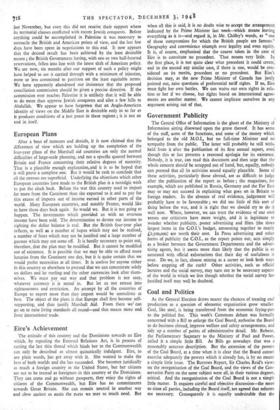European Plans
After a bout of rumours and denials, it is now claimed that the differences of view which are holding up the completion of the four-year plans of the Marshall aid countries are only the normal difficulties of large-scale planning, and not a specific quarrel between Britain and France concerning their relative degrees of austerity. -That is a plausible enough explanation, and it is to be hoped that it will prove a complete one. But it would be rash to conclude that all the stresses are superficial. Underlying the objections which other European countries have made to the British plan is a nostalgic wish to put the clock back. Before the war this country used to import far more from the Continent than she exported to it and to pay for this excess of imports out of income earned in other parts of the world. Many European countries, and notably France, would like to have those days back again. So would we. But it is not going to happen. The investments which provided us with an overseas income have been sold. The determination to devote our income to righting the dollar balance is real. But the British four-year plan reflects,. as well as a number of hopes which may not be realised, a number of fears which may not be justified and a large number of guesses which may not come off. It is hardly necessary to point out, therefore, that the plan may be modified. But it cannot be modified out of existence. It is possible that we may be able to afford more luxuries from the Continent one day, but it is quite certain that we would prefer necessities at all times. It is useless for anyone either in this country or elsewhere to pretend that we can concentrate solely on dollars and let sterling and the other currencies look after them- selves. We must pay our way and that problem is not easy, whatever currency it is stated in. But let us not retreat into righteousness and restriction. An attempt by all the countries of Europe to export more than they import would be unrealistic at best. The object of the plans is that Europe shall first become self- supporting, and thus justify Marshall Aid. From there we can go on to raise living standards all round—and that means more and. freer international trade.


































 Previous page
Previous page